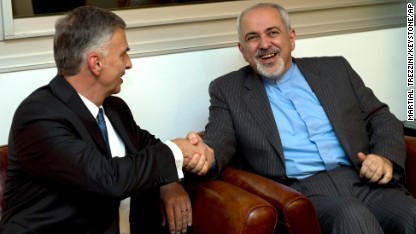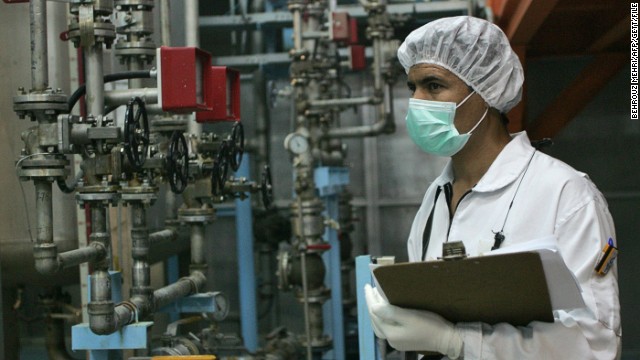Results 1 to 3 of 3
Thread Information
Users Browsing this Thread
There are currently 1 users browsing this thread. (0 members and 1 guests)
-
11-23-2013, 10:29 PM #1
DEAL STRUCK WITH IRAN ON NUCLEAR PROGRAM
BREAKING NEWS
BREAKING NEWS
DEAL STRUCK WITH IRAN ON NUCLEAR PROGRAM

Agreement comes in extended talks
The Western powers have been working toward rolling back Iran's suspected march toward a nuclear weapon; Tehran wants a loosening of the economic sanctions that are strangling its economy. FULL STORY
NO AMNESTY
Don't reward the criminal actions of millions of illegal aliens by giving them citizenship.
Sign in and post comments here.
Please support our fight against illegal immigration by joining ALIPAC's email alerts here https://eepurl.com/cktGTn
-
11-23-2013, 10:35 PM #2

An agreement has been reached with Iran on its nuclear program, European Union spokesman Michael Mann has tweeted.
EU spokesman: Iran nuclear deal reached
By Jim Sciutto. Ben Brumfield and Chelsea J. Carter, CNN
updated 9:08 PM EST, Sat November 23, 2013
 Iran is negotiating with world powers over the future of its nuclear program. Click through the gallery for an overview of how enriched uranium is made.
Iran is negotiating with world powers over the future of its nuclear program. Click through the gallery for an overview of how enriched uranium is made.
STORY HIGHLIGHTS
- NEW: EU spokesman Michael Mann tweets early Sunday that there's a deal
- Iran's deputy foreign minister says the sticking point is language in the agreement
- "Better progress has been made today compared with yesterday," the deputy foreign minister said
- Iran's foreign minister says they are 90% of the way there
Geneva, Switzerland (CNN) -- [Breaking news update at 9:08 p.m. ET]
(CNN) -- An agreement has been reached on Iran and its nuclear program following intense talks in Geneva, European Union spokesman Michael Mann tweeted early Sunday.
[Original story published at 8:48 p.m. ET]
(CNN) -- Efforts to hammer out an agreement between Iran and six world powers over Tehran's nuclear program stretched into the early morning hours Sunday as negotiators struggled to overcome differences.
The sticking point, according to Iran's deputy foreign minister, is over the wording of an initial agreement that would temporarily halt Iran's nuclear development program and lift some sanctions while a more formal deal between the two sides is worked out.
The assessment by Abbas Araqchi, carried by Iran's Fars News Agency, came during a marathon fourth day of negotiations.
Both sides have hinted that a deal is close.
"Work is still ongoing as we speak here and now. There are still meetings going on of different types. A deal has not been done," a European Union diplomat, speaking on condition of anonymity because of the sensitivity of the issue, told CNN.
The two sides are having tough debate over the wording of the deal, specifically over details that would provide short-term relief from sanctions that Iran has been under, Araqchi told FARS.
Araqchi told Iranian state-run Press TV early Sunday that "98% of the nuclear issues" have been resolved.
The negotiations initially scheduled for two days were extended to four days with the hopes of reaching an agreement.
Extended negotiations
It's unclear whether they will continue into a fifth day on Sunday. U.S. Secretary of State John Kerry is scheduled to travel to London on Sunday to meet with his British counterpart, William Hague.
Kerry has been joined in the talks in Geneva by Hague, German Foreign Minister Guido Westerwelle, French Foreign Minister Laurent Fabius, Chinese Foreign Minister Wang Yi and their Russian counterpart, Sergey Lavrov.
Together, these diplomats represent the five permanent members of the U.N. Security Council plus Germany -- together known as the P5+1 -- which has been negotiating with Iran on its nuclear program.
The P5+1 believe Iran is intent on developing nuclear weaponry, an allegation Iran denies. Iran wants to ease the sanctions imposed upon it, and seeks explicit permission to enrich uranium for peaceful purposes.
Tehran wants that written into the deal, which would likely cover a period of six months and ideally be a precursor to a more sweeping pact, diplomats said.
On the other side of the negotiating table, the world powers want assurances that Iran will not build nuclear weaponry, and offer transparency at its nuclear facilities.
Washington and its allies also only want to lift only some of the sanctions, and leave some tough ones in place for now.
In a sign of advancing talks, Kerry, European Union foreign policy chief Catherine Ashton and Iranian Foreign Minister Mohammad Javad Zarif held two separate meetings on Saturday, including a more than 30-minute meeting that began shortly before 10 p.m. local time.
Details of the meeting were not immediately disclosed.
11 things you need to know about the Iran nuclear talks
Curbing the enthusiasm
"It's not a done deal," said Germany's Westerwelle, who walked out of the negotiation venue to give the statement to journalists.
Significant differences still stand in the way, and the world's most powerful diplomats have come to do their best to work them out.
"We think there is a realistic chance, but there is still a lot of work to do," he said, before turning away from the microphones.
Hague echoed Westerwelle's caution.
"We're not here because things are necessarily finished. We're here because they're difficult," he said.
Iran's foreign minister, Zarif, said Friday there is wide agreement except for a couple of points, the semiofficial Iranian Students News Agency (ISNA) reported.
"Numerically speaking, perhaps 90% of progress has been made, but there (are) one or two issues which are of great significance," he said, according to ISNA.
Opinion: Israel, U.S. - stop dissing each other over Iran
Change in tone
For years, Iran and Western powers have left negotiating tables in disagreement, frustration and at times open animosity.
But the diplomatic tone changed with the transfer of power after Iran's election this year, which saw President Hassan Rouhani replace Mahmoud Ahmadinejad.
Caustic jabs at the United States and bellicose threats toward Israel were a hallmark of Ahmadinejad's foreign policy rhetoric.
He lambasted the West over the economic sanctions crippling Iran's economy and at the same time, pushed the advancement of nuclear technology in Iran.
Rouhani has struck up a more conciliatory tone and made the lifting sanctions against his country a priority.
Despite the sanctions, Iran today has 19,000 centrifuges and is building more advanced ones, according to Mark Hibbs, a nuclear policy expert at the Carnegie Endowment for International Peace.
Most world powers believe that Iran could not realistically build a usable bomb in less than a year, Hibbs said.
And Iran recently signed a deal with the International Atomic Energy Agency that agrees to give the U.N. nuclear watchdog agency access to long-unseen nuclear sites, including a heavy-water reactor in Arak.
Tehran is also a party to the Treaty on the Non-Proliferation of Nuclear Weapons, which requires it not to create nuclear weapons or enable other countries to obtain them.
Iran's nuclear capabilities - Fast Facts
Lingering distrust
Key U.S. allies in the Middle East and some Washington lawmakers still don't trust Iran.
They believe that by making concessions on sanctions, the United States and its allies are giving up important leverage against Tehran.
Saudi Arabia, Iran's neighbor across the Persian Gulf, has lasting tensions with Tehran and has publicly derided the Obama administration's negotiating stance.
Israeli leaders, as well, would like to see the heat turned up on Tehran, not down. Defense Minister Moshe Ya'alon reiterated the point after a meeting with U.S. Secretary of Defense Chuck Hagel on Saturday in Israel.
Israeli Prime Minister Benjamin Netanyahu has been adamant in his distrust of Tehran and his belief that sanctions are working and should get tougher.
But President Barack Obama said that sanctions put in place during his administration had forced Iran to the negotiating table and easing them some could help move things forward.
The proposed deal would only "open up the spigot a little bit" on frozen revenue, while leaving in place the bulk of the most effective sanctions involving Iranian oil exports and banking.
The President also stressed that all options, including military strikes on Iran's nuclear facilities, remained on the table as far as the United States was concerned.
READ: Kerry says now the 'best chance ... in a decade' for Iran nuclear deal
http://www.cnn.com/2013/11/23/world/...html?hpt=hp_t1
NO AMNESTY
Don't reward the criminal actions of millions of illegal aliens by giving them citizenship.
Sign in and post comments here.
Please support our fight against illegal immigration by joining ALIPAC's email alerts here https://eepurl.com/cktGTn
-
11-24-2013, 12:13 AM #3
Sadly I don't believe Iran or this administration, from what I heard tonight we will release frozen money from Iran which IMO will give them means to purchase more weapons/rockets from north Korea, Russia, China, well it's good this administration is producing work for some countries.

One good thing for this administration this news will get the media off Obama care.I'm old with many opinions few solutions.


 LinkBack URL
LinkBack URL About LinkBacks
About LinkBacks




 Reply With Quote
Reply With Quote


Twitter just suspended Ad account on X
04-19-2024, 05:54 PM in illegal immigration Announcements